136 scholarly books by Dartmouth College Press and 9
start with C
136 scholarly books by Dartmouth College Press and 9
136 scholarly books by Dartmouth College Press
9 start with C start with C
9 start with C start with C
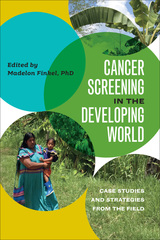
Cancer Screening in the Developing World
Case Studies and Strategies from the Field
Edited by Madelon L. Finkel
Dartmouth College Press, 2018
Worldwide, cancer is responsible for one in eight deaths—more than AIDS, tuberculosis, and malaria combined. This global burden starkly illustrates the inequality between the developed and the developing world. While the majority of people living in developed countries receive timely treatment, those living in developing countries are not as fortunate and their survival rates are much lower—not only due to delays in diagnosis, but also to a lack of personnel, a paucity of treatment facilities, and the unavailability of many medications. Routine screening—a mainstay in the developed world—could greatly increase the likelihood of identifying individuals with early stage cancers and thus reduce the number of people who present with advanced disease. This book represents a critical addition to the literature of global health studies. Focusing on cervical, breast, and oral cancers, these case studies highlight innovative strategies in cancer screening in a diverse array of developing countries. The authors discuss common issues and share how obstacles—medical, economic, legal, social, and psychological—were addressed or overcome in specific settings. Each chapter offers an empirical discussion of the nature and scope of a screening program, the methodology used, and its findings, along with a candid discussion of challenges and limitations and suggestions for future efforts.
[more]

Captivity and Sentiment
Cultural Exchange in American Literature, 1682–1861
Michelle Burnham
Dartmouth College Press, 2000
In a radically new interpretation and synthesis of highly popular 18th- and 19th-century genres, Michelle Burnham examines the literature of captivity, and, using Homi Bhabha's concept of interstitiality as a base, provides a valuable redescription of the ambivalent origins of the US national narrative. Stories of colonial captives, sentimental heroines, or fugitive slaves embody a "binary division between captive and captor that is based on cultural, national, or racial difference," but they also transcend these pre-existing antagonistic dichotomies by creating a new social space, and herein lies their emotional power. Beginning from a simple question on why captivity, particularly that of women, so often inspires a sentimental response, Burnham examines how these narratives elicit both sympathy and pleasure. The texts carry such great emotional impact precisely because they "traverse those very cultural, national, and racial boundaries that they seem so indelibly to inscribe. Captivity literature, like its heroines, constantly negotiates zones of contact," and crossing those borders reveals new cultural paradigms to the captive and, ultimately, the reader.
[more]
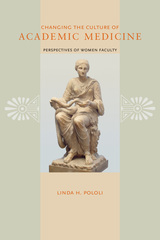
Changing the Culture of Academic Medicine
Perspectives of Women Faculty
Linda H. Pololi
Dartmouth College Press, 2010
Over the past twenty-five years, steadily increasing numbers of women have graduated as physicians, in sufficient numbers to be well represented in senior and leadership positions in the nation’s academic medical centers. Yet women’s expected advancement has stalled. Women rarely hold decision-making positions, and female department chairs or deans continue to be exceedingly rare. Why is this the case? Pololi’s study, based on extensive interviews, illuminates medical school culture and shows a sharp disconnect between the values of individual faculty members and the values of academic institutions of medicine. Pololi looks closely at women medical faculty’s experiences as outsiders in medicine, opening a window into medical culture. She argues that placing more women and people of color in leadership positions would provide transformative and more effective leadership to improve health care and would help address current inequities in the health care provided to different racial and cultural groups.
[more]
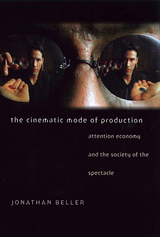
The Cinematic Mode of Production
Attention Economy and the Society of the Spectacle
Jonathan Beller
Dartmouth College Press, 2006
“Cinema brings the industrial revolution to the eye,” writes Jonathan Beller, “and engages spectators in increasingly dematerialized processes of social production.” In his groundbreaking critical study, cinema is the paradigmatic example of how the act of looking has been construed by capital as “productive labor.” Through an examination of cinema over the course of the twentieth century, Beller establishes on both theoretical and historical grounds the process of the emergent capitalization of perception. This process, he says, underpins the current global economy. By exploring a set of films made since the late 1920s, Beller argues that, through cinema, capital first posits and then presupposes looking as a value-productive activity. He argues that cinema, as the first crystallization of a new order of media, is itself an abstraction of assembly-line processes, and that the contemporary image is a politico-economic interface between the body and capitalized social machinery. Where factory workers first performed sequenced physical operations on moving objects in order to produce a commodity, in the cinema, spectators perform sequenced visual operations on moving montage fragments to produce an image. Beller develops his argument by highlighting various innovations and film texts of the past century. These innovations include concepts and practices from the revolutionary Soviet cinema, behaviorism, Taylorism, psychoanalysis, and contemporary Hollywood film. He thus develops an analysis of what amounts to the global industrialization of perception that today informs not only the specific social functions of new media, but also sustains a violent and hierarchical global society.
[more]
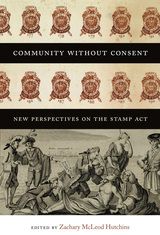
Community without Consent
New Perspectives on the Stamp Act
Edited by Zachary McLeod Hutchins
Dartmouth College Press, 2016
The first book-length study of the Stamp Act in decades, this timely collection draws together essays from a broad range of disciplines to provide a thoroughly original investigation of the influence of 1760s British tax legislation on colonial culture, and vice versa. While earlier scholarship has largely focused on the political origins and legacy of the Stamp Act, this volume illuminates the social and cultural impact of a legislative crisis that would end in revolution. Importantly, these essays question the traditional nationalist narrative of Stamp Act scholarship, offering a variety of counter identities and perspectives. Community without Consent recovers the stories of individuals often ignored or overlooked in existing scholarship, including women, Native Americans, and enslaved African Americans, by drawing on sources unavailable to or unexamined by earlier researchers. This urgent and original collection will appeal to the broadest of interdisciplinary audiences.
[more]

The Confessions and Correspondence, Including the Letters to Malesherbes
Jean-Jacques Rousseau
Dartmouth College Press, 1998
When Rousseau first read his Confessions to a 1770 gathering in Paris, reactions varied from admiration of his candor to doubts about his sanity to outrage. Indeed, Rousseau's intent and approach were revolutionary. As one of the first attempts at autobiography, the Confessions' novelty lay not in just its retelling the facts of Rousseau's life, but in its revelation of his innermost feelings and its frank description of the strengths and failings of his character. Based on his doctrine of natural goodness, Rousseau intended the Confessions as a testing ground to explore his belief that, as Christopher Kelly writes, "people are to be measured by the depth and nature of their feelings." Re-created here in a meticulously documented new translation based on the definitive Pléiade edition, the work represents Rousseau's attempt to forge connections among his beliefs, his feelings, and his life. More than a "behind-the-scenes look at the private life of a public man," Kelly writes, "the Confessions is at the center of Rousseau's philosophical enterprise."
[more]
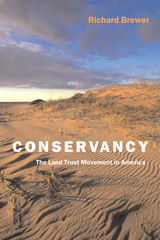
Conservancy
The Land Trust Movement in America
Richard Brewer
Dartmouth College Press, 2004
Land trusts, or conservancies, protect land by owning it. Although many people are aware of a few large land trusts—The Nature Conservancy and the Trust for Public Land, for instance—there are now close to 1,300 local trusts, with more coming into being each month. American land trusts are diverse, shaped by their missions and adapted to their local environments. Nonetheless, all land trusts are private, non-profit organizations for which the acquisition and protection of land by direct action is the primary or sole mission. Nonconfrontational and apolitical, land trusts work with willing land owners in voluntary transactions. Although land trusts are the fastest-growing and most vital part of the land conservation movement today, this model of saving land by private action has become dominant only in the past two decades. Brewer tells why the advocacy model—in which private groups try to protect land by promoting government purchase or regulation— in the 1980s was eclipsed by the burgeoning land trust movement. He gives the public a much-needed primer on what land trusts are, what they do, how they are related to one another and to other elements of the conservation and environmental movements, and their importance to conservation in the coming decades. As Brewer points out, unlike other land-saving measures, land trust accomplishments are permanent. At the end of a cooperative process between a landowner and the local land trust, the land is saved in perpetuity. Brewer’s book, the first comprehensive treatment of land trusts, combines a historical overview of the movement with more specific information on the different kinds of land trusts that exist and the problems they face. The volume also offers a "how-to" approach for persons and institutions interested in donating, selling, or buying land, discusses four major national land trusts (The Nature Conservancy, Trust for Public Land, American Farmland Trust, and Rails-to-Trails Conservancy); and gives a generous sampling of information about the activities and accomplishments of smaller, local trusts nationwide. Throughout, the book is enriched by historical narrative, analysis of successful land trusts, and information on the how and why of protecting land, as well as Brewer’s intimate knowledge of ecological systems, biodiversity, and the interconnectedness of human and non-human life forms. Conservancy is a must-read volume for people interested in land conservation—including land trust members, volunteers and supporters—as well as anyone concerned about land use and the environment.
[more]
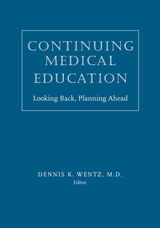
Continuing Medical Education
Looking Back, Planning Ahead
Edited by Dennis K. Wentz
Dartmouth College Press, 2011
Continuing medical education (CME) is a mainstay for ongoing learning by practicing physicians. Often considered the third and final phase of medical education, CME differs significantly from earlier phases of training. Unlike medical school and residency/fellowship, CME requires physicians to respond voluntarily to their educational needs; there is no specified curriculum, and practice settings are all different. The essays in this volume tell the history and evolution of CME in the United States and Canada, but also look toward future issues and developments. Contributors from a diverse array of institutions explore CME’s emergence from undergraduate medical education and its separate growth and development, key events and breakthroughs, lessons learned, conflicts, and predictions about the future in their area of expertise. Addressing critical issues, such as industry support for CME, the volume offers a vital tool for continuing medical education professionals, physicians, administrators, and all health care practitioners interested in the future of continuous education and quality patient care.
[more]
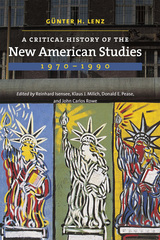
A Critical History of the New American Studies, 1970–1990
Günter H. Lenz
Dartmouth College Press, 2016
Starting in 2005, Günter H. Lenz began preparing a book-length exploration of the transformation of the field of American Studies in the crucial years between 1970 and 1990. As a commentator on, contributor to, and participant in the intellectual and institutional changes in his field, Lenz was well situated to offer a comprehensive and balanced interpretation of that seminal era. Building on essays he wrote while these changes were ongoing, he shows how the revolution in theory, the emergence of postmodern socioeconomic conditions, the increasing globalization of everyday life, and postcolonial responses to continuing and new forms of colonial domination had transformed American Studies as a discipline focused on the distinctive qualities of the United States to a field encompassing the many different “Americas” in the Western Hemisphere as well as how this complex region influenced and was interpreted by the rest of the world. In tracking the shift of American Studies from its exceptionalist bias to its unmanageable global responsibilities, Lenz shows the crucial roles played by the 1930s’ Left in the U.S., the Frankfurt School in Germany and elsewhere between 1930 and 1960, Continental post-structuralism, neo-Marxism, and post-colonialism. Lenz’s friends and colleagues, now his editors, present here his final backward glance at a critical period in American Studies and the birth of the Transnational.
[more]
READERS
Browse our collection.
PUBLISHERS
See BiblioVault's publisher services.
STUDENT SERVICES
Files for college accessibility offices.
UChicago Accessibility Resources
home | accessibility | search | about | contact us
BiblioVault ® 2001 - 2024
The University of Chicago Press









